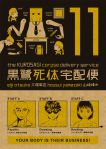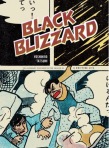After a couple of months of fairly jam-packed Previews catalogs, I suppose it could seem petty to complain that the current listings seem a little slender. There aren’t even enough debuts to manage a dubious manga poll for the month. Fortunately, there are some highlights worth noting.
Book of Human Insects, written and illustrated by Osamu Tezuka, Vertical, item code MAY 11 1268: How can one complain about a month that offers the English-language debut of crazy Tezuka seinen? This one originally ran in Akita Shoten’s Play Comic and has been published in French by Casterman as La femme insecte. It’s a mystery about an unscrupulous and manipulative woman. Vertical promises “more twists and turns than MW,” which hardly seems possible.
Veronica #208: Veronica Presents Kevin Keller #2: written and illustrated by Dan Parent, colored by Rich Koslowski, Archie Comics, item code MAY 11 0836: Okay, I missed mentioning the first issue of this, but Kevin (Robot 6) Melrose’s preview of part two of the mini-series about Riverdale’s newest resident, who happens to be gay, reminded me to be excited. (And just as a side note, who would have predicted that Archie would have proven to be the nimblest and most risk-friendly of pamphlet publishers? Not me, that’s for sure.)
Until the Full Moon, written and illustrated by Sanami Matoh, Kodansha Comics, item code MAY 11 1129: This isn’t a debut, per se, as the series was previously published by Broccoli Books. I thought the first volume was kind of dull back then, but I’m among the many who hold a special place in my heart for Matoh’s Fake (Tokyopop), so I thought this book’s return was worth mentioning.
That’s pretty much it as far as debuts go. Here are some particularly enticing new volumes of ongoing series.
Little Nothings volume 4: My Shadow in the Distance, written and illustrated by Lewis Trondheim, NBM, item code MAY 11 1142: These are smart, charming, observational-autobiographical comics from an incredibly talented creator, and they’re incredibly easy on the eye. You can check out a bunch of them at Trondheim’s blog for NBM.
And here’s a by-no-means complete list of new volumes of ongoing series that I’m looking forward to reading:
- 20th Century Boys vol. 16, written and illustrated by Naoki Urasawa, Viz Media, item code MAY 11 1241
- Arisa vol. 3, written and illustrated by Natsumi (Kitchen Princess) Ando, Kodansha Comics, item code MAY 11 1122
- Black Jack vol. 17, written and illustrated by Osamu Tezuka, Vertical, item code MAY 11 1269
- Book Girl and the Captive Fool, written by Mizuki Nomura, Yen Press, item code MAY 11 1281
I’ll post another blind date experiment with the current batch of boys’-love candidates tomorrow.






























